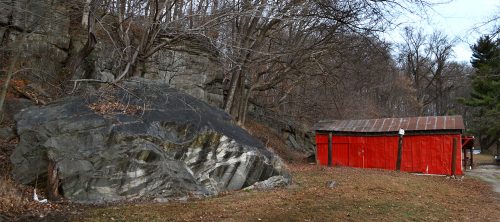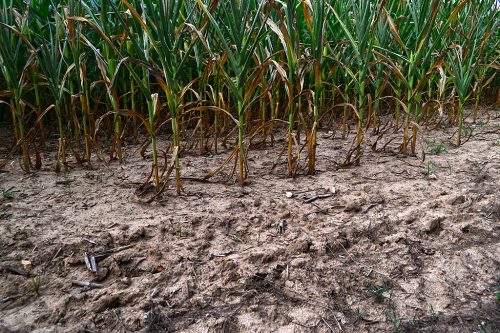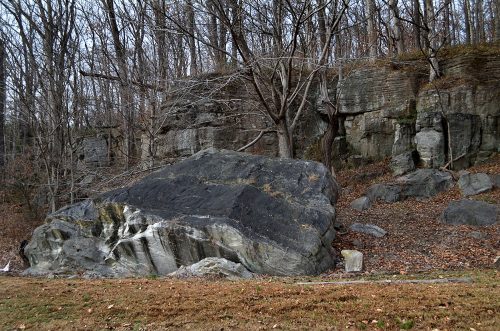 When I have new folks on a road trip with me to Advance, Bloomfield or points south, when we get near Dutchtown, I ask them if they’ve heard the story of the famous (in Dutchtown, at least) Restin’ Rock?
When I have new folks on a road trip with me to Advance, Bloomfield or points south, when we get near Dutchtown, I ask them if they’ve heard the story of the famous (in Dutchtown, at least) Restin’ Rock?
Of course, they say “no,” because that’s the kind of story you only hear if you’ve spent time sittin’ and rocking on the front porch with the oldtimers who helped tame Swampeast Missouri. In the summer, you’d sit on the porch; in the winter, these old goats would hold court around the big pot-bellied stove in the back of my grandfather’s liquor store in Advance.
Anyway, getting back to the story that took place back before big-wheeled, air-conditioned tractors were even a dream. Silas and his wife lived in a farmhouse in the shadow of the big hill dominating the tiny burg of Dutchtown. The field he worked across the road used to be in the flood plain of the Mississippi River before it broke through the Thebes Gap to go on its present course to New Orleans.
Iced tea (sweet, of course)
 At the end of a long day working his fields, Silas would put away his team, then walk into the kitchen, where his wife would have a big, cold pitcher of ice tea waiting (sweet, no lemon, of course). It was funny that I never knew what Mrs. Silas’ name was. She was always referred to as “his wife” or “Silas’ wife,” in the custom of the time.
At the end of a long day working his fields, Silas would put away his team, then walk into the kitchen, where his wife would have a big, cold pitcher of ice tea waiting (sweet, no lemon, of course). It was funny that I never knew what Mrs. Silas’ name was. She was always referred to as “his wife” or “Silas’ wife,” in the custom of the time.
On a hot, steamy August day, Silas came in from the fields like always and snatched up a huge tumbler of iced tea. The humidity was high because it had rained hard for a short time the night before, just enough to make the air steamy, but not for so long that the field was too muddy to work.
Silas took his glass of tea out to go sit in a swing he had hung in the shade of a huge boulder clinging to the side of the big hill behind their house. He called it his “restin’ rock.” He liked sitting there looking over his field, feeling good about what he had accomplished, then wondering, as farmers do, if a hail storm would wipe him out; or if the river would come up; or if there would be too much rain or too little rain or it would come at the wrong time; or if there would be a “too good” harvest in the area that would depress prices.
It gave one bounce
He had just taken a couple swigs of the iced tea and had wiped the sweating glass across his equally sweating brow when he felt a pebble bounce off the swing seat next to him. Then, a strange shadow engulfed him from the monstrous boulder that that had given him comfort for so many years. It gave one bounce, taking out a few saplings on the way down, then landed smack-dab on top of Silas and his swing.
There was much speculation later about what happened: some blamed the rain the night before; some thought it was a freakish gust of wind; others wrote it off as “God’s Will.”
Mrs. Silas and the neighbors felt the impact and went running to see what had happened. Mrs. Silas fainted dead away when she saw where the rock had landed, and didn’t see her husband around.
‘Really?’
 When she revived, her neighbors tried to break the news that the rock was so large there wasn’t anything in the county that could lift that much weight, and, even if they could lift it, there would most likely be nothing under it that resembled Silas.
When she revived, her neighbors tried to break the news that the rock was so large there wasn’t anything in the county that could lift that much weight, and, even if they could lift it, there would most likely be nothing under it that resembled Silas.
“Well,” she said, women being just as strong and pragmatic as the men in those days, “he always called it his “restin’ rock,” so it’s there he will rest until the Good Lord calls us all home.
After I’ve told that story and driven by to show my passengers the Restin’ Rock, they invariably ask, “Really?”
That’s when I look heavenward, give a nod to Mother, and reply, “Sure. Really. Do you think I’d fib to you about something like that?”
